Explore mobile connectivity trends and insights in Uruguay.
January 10, 2025
Written by Turian Biel

Table of Contents
- Mobile Phone Statistics in Uruguay: Key Insights and Trends
- Mobile Network Coverage and Quality in Uruguay
- Overview of Mobile Network Technologies in Uruguay
- Mobile Phone Ownership Trends in Uruguay
- Impact of eSIM Technology in Uruguay
- Mobile Data Usage Patterns in Uruguay
- Mobile Advertising Trends in Uruguay
- Government Initiatives to Enhance Mobile Connectivity
- Mobile Payment Adoption in Uruguay
- Challenges Facing the Mobile Market in Uruguay
- Future Projections for Mobile Connectivity in Uruguay
- Mobile Device Preferences Among Users in Uruguay
- Mobile Internet Accessibility and Usage in Uruguay
- Statistics on Internet Accessibility in Uruguay
- Mobile Application Usage Trends in Uruguay
- Mobile Data Pricing and Plans in Uruguay
- Mobile Device Market Trends in Uruguay
- Mobile Connectivity Challenges in Uruguay
- Government Policies Supporting Mobile Development
- Consumer Behavior and Mobile Spending in Uruguay
- Mobile Health Applications in Uruguay
- Impact of COVID-19 on Mobile Connectivity
- Future of Mobile Technology in Uruguay
- Mobile Security and Privacy Concerns in Uruguay
- Mobile Industry Innovations and Developments in Uruguay
- Emerging Technologies in the Mobile Sector
- Mobile Gaming Trends in Uruguay
- Impact of Social Media on Mobile Usage
- Mobile Infrastructure Development Initiatives
- Consumer Preferences for Mobile Devices
- Mobile Health Initiatives in Uruguay
- Mobile Payment Trends and Adoption
- Future Outlook for Mobile Connectivity in Uruguay
- Mobile Payment Trends and Innovations in Uruguay
- Growth of Mobile Payment Solutions in Uruguay
- Impact of Fintech on Mobile Payments in Uruguay
- Consumer Preferences in Mobile Payment Methods
- Challenges Facing Mobile Payment Adoption
- Regulatory Environment for Mobile Payments in Uruguay
- Future Innovations in Mobile Payment Technology
- Mobile Payment Security Measures in Uruguay
- Consumer Education on Mobile Payment Security
- Conclusion
Mobile Phone Statistics in Uruguay: Key Insights and Trends
Current Mobile Phone Usage and Trends in Uruguay
As of 2022, Uruguay had approximately 4.5 million mobile phone subscriptions, translating to about 126 subscriptions per 100 people. The mobile penetration rate reached 94 percent of the population covered by LTE-4G services. In 2023, about 90% of the Uruguayan population is an active Internet user. The share of mobile traffic in Uruguay was reported at 55.69%, with a growth of 14.3%. In 2024, the average ad spend per internet user in the In-App Advertising segment is projected to be around $17.6. Furthermore, mobile data service revenue in Uruguay is expected to grow at a CAGR of 11%. The mobile market is primarily dominated by Antel, which holds a 50% market share, followed by Movistar and Claro. In 2024, there are 147 eSIM plans available, with prices ranging from $1.00 per GB to $30.3 per GB.
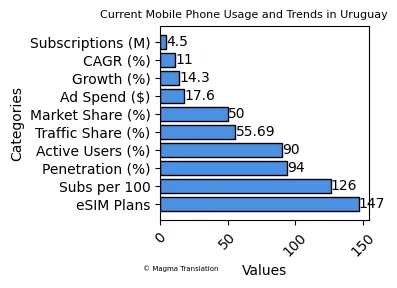
Mobile Network Coverage and Quality in Uruguay
Overview of Mobile Network Technologies in Uruguay
In Uruguay, mobile network coverage includes 2G, 3G, 4G, and 5G technologies, with 100% mobile network coverage achieved as of 2016. The country has a mobile penetration rate of 94%, with LTE-4G services available in major urban areas. The average download speed for 4G LTE is around 100 Mb per second. Additionally, the mobile market is dominated by Antel, which holds a 51.5% market share, followed by Movistar and Claro. The coverage maps are updated automatically, ensuring reliable statistics for users.
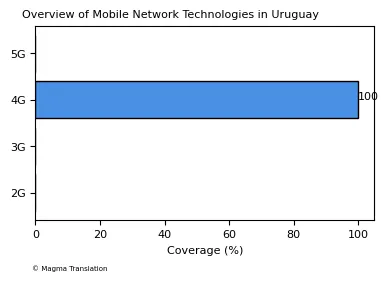
Mobile Phone Ownership Trends in Uruguay
As of 2021, mobile phone ownership in Uruguay was reported at 84.17% for women and 82.32% for men, resulting in an overall ownership rate of 83.28%. The number of mobile connections in January 2021 reached 5.76 million, representing 165.5% of the total population. This indicates that many individuals own multiple devices, contributing to the high penetration rate.
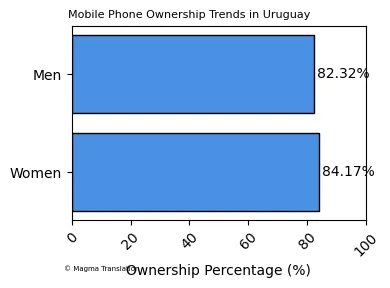
Impact of eSIM Technology in Uruguay
Uruguay has embraced eSIM technology, allowing users to activate mobile plans and switch carriers easily. The availability of various eSIM plans has increased, with options such as 1GB for $5.90 and 5GB for $26.90. This technology enhances flexibility for travelers and locals alike, making it easier to manage network connections directly from compatible devices.
Mobile Data Usage Patterns in Uruguay
In 2023, mobile data usage in Uruguay showed that approximately 66% of total purchases were made online, an increase from 53% in 2020. The mobile application WhatsApp is a primary gateway for new users, while Instagram has become the second most used social network among the younger population. The growth in mobile data usage is supported by the increasing number of smartphone users, which is projected to reach 4 million by 2030.
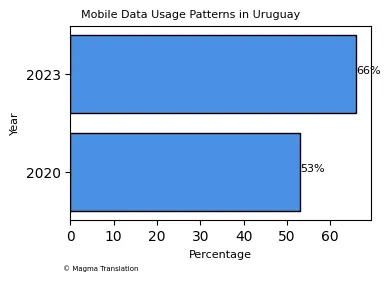
Mobile Advertising Trends in Uruguay
The average ad spend per internet user in the In-App Advertising segment in Uruguay is projected to be around $17.6 in 2024. The share of mobile traffic in Uruguay was reported at 55.69%, indicating a significant shift towards mobile advertising. This trend is driven by the increasing smartphone penetration and the growing popularity of mobile applications.
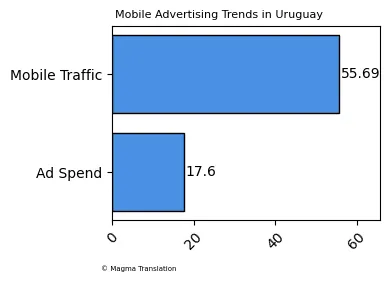
Government Initiatives to Enhance Mobile Connectivity
The Uruguayan government has implemented various initiatives to enhance mobile connectivity, including the auction of multi-band spectrum that has expanded LTE coverage. As of 2024, the mobile market is expected to grow, driven by the deployment of 5G services. The government aims to achieve 13% 5G penetration by 2025, expanding to 65% by 2030.
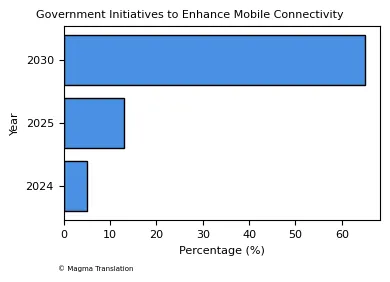
Mobile Payment Adoption in Uruguay
Mobile payment adoption in Uruguay has seen significant growth, with over 90% of the population having internet connectivity. The use of mobile wallets and payment apps has increased, particularly among younger demographics. In 2023, mobile payments accounted for a substantial portion of online transactions, reflecting the changing consumer behavior towards digital payments.
Challenges Facing the Mobile Market in Uruguay
Despite the growth in mobile connectivity, challenges remain in the Uruguayan mobile market. Issues such as network reliability and coverage in rural areas persist. Additionally, the competition among operators like Antel, Movistar, and Claro continues to shape the market dynamics. The need for improved infrastructure and investment in technology is crucial for sustaining growth.
Future Projections for Mobile Connectivity in Uruguay
Looking ahead, the mobile connectivity landscape in Uruguay is expected to evolve significantly. The mobile market size is estimated at USD 2.46 billion in 2024, with projections to reach USD 2.53 billion by 2029. The growth will be driven by increasing smartphone ownership and the adoption of higher-ARPU 4G/5G services.
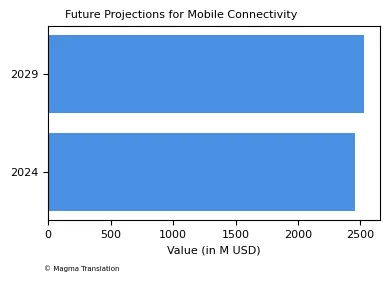
Mobile Device Preferences Among Users in Uruguay
In Uruguay, the preference for mobile devices is shifting towards smartphones, with a significant percentage of users opting for high-end models. As of 2024, Samsung holds 32.68% of the mobile vendor market share, followed by Apple at 30.27% and Xiaomi at 22.2%. This trend indicates a growing demand for advanced mobile technology among consumers.
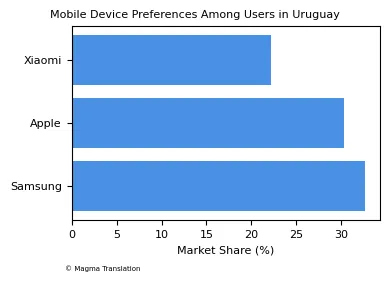
Mobile Internet Accessibility and Usage in Uruguay
Statistics on Internet Accessibility in Uruguay
As of 2022, the percentage of individuals using the Internet in Uruguay was reported at 89.87%, according to the World Bank. This statistic reflects the proportion of the population that has accessed the Internet from any location within the last three months. The digital media environment is evolving rapidly, with a significant focus on mobile technology, achieving a mobile phone penetration rate of over 100%. In 2023, approximately 66% of total purchases were made online, indicating a shift towards e-commerce.
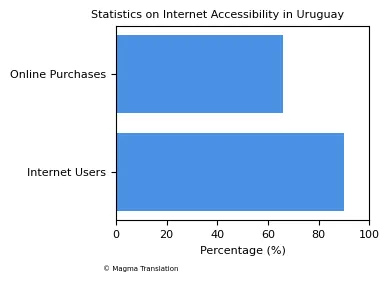
Mobile Application Usage Trends in Uruguay
Mobile applications have become increasingly popular in Uruguay, with WhatsApp being a primary gateway for new users. In 2023, it was reported that over 90% of the population has internet connectivity, facilitating the use of various mobile apps. Instagram has emerged as the second most used social network among the younger population, while Facebook's usage has declined. The rise in mobile app usage is also reflected in the growing number of downloads and active users across different platforms.
Mobile Data Pricing and Plans in Uruguay
The mobile data pricing landscape in Uruguay offers various options for consumers. For instance, eSIM plans are available, including 1GB for $5.90 and 5GB for $26.90. The average cost of mobile data ranges from UYU 100 to UYU 400 for different data packages, depending on the provider. Additionally, the eSIM data roaming tariff in Uruguay is €9 per GB, with the first 100MB of data for free when activating an eSIM card.
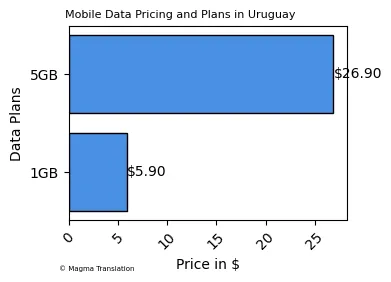
Mobile Device Market Trends in Uruguay
The mobile device market in Uruguay is characterized by a diverse range of smartphones and brands. As of 2024, Samsung holds 32.68% of the mobile vendor market share, followed by Apple at 30.27% and Xiaomi at 22.2%. This trend indicates a growing demand for advanced mobile technology among consumers, with a significant focus on high-end devices. The market is also witnessing an increase in the adoption of budget-friendly smartphones.
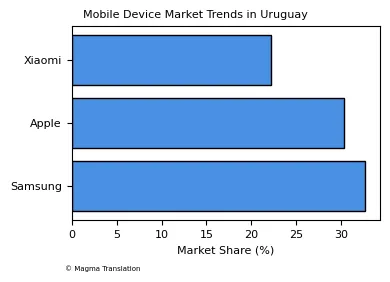
Mobile Connectivity Challenges in Uruguay
Despite the advancements in mobile connectivity, challenges remain in the Uruguayan mobile market. Issues such as network reliability and coverage in rural areas persist. The competition among operators like Antel, Movistar, and Claro continues to shape the market dynamics. Additionally, the need for improved infrastructure and investment in technology is crucial for sustaining growth and ensuring equitable access to mobile services across the country.
Government Policies Supporting Mobile Development
The Uruguayan government has implemented various policies to support mobile development and connectivity. Initiatives include the auction of multi-band spectrum that has expanded LTE coverage. As of 2024, the mobile market is expected to grow, driven by the deployment of 5G services. The government aims to achieve 13% 5G penetration by 2025, expanding to 65% by 2030.
Consumer Behavior and Mobile Spending in Uruguay
Consumer behavior in Uruguay reflects a growing reliance on mobile technology for daily activities. In 2023, mobile payments accounted for a substantial portion of online transactions, with over 90% of the population having internet connectivity. The average ad spend per internet user in the In-App Advertising segment is projected to be around $17.6 in 2024, indicating a shift towards digital marketing strategies.
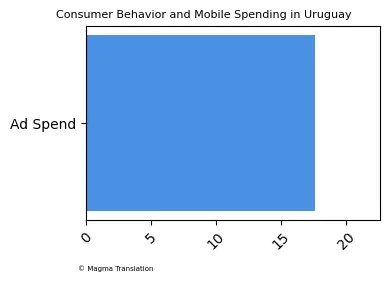
Mobile Health Applications in Uruguay
Mobile health applications are gaining traction in Uruguay, particularly in the wake of the COVID-19 pandemic. These applications facilitate telemedicine services, allowing users to consult healthcare professionals remotely. The adoption of mobile health solutions is supported by the increasing smartphone penetration and internet accessibility, with over 90% of the population having internet connectivity. This trend is expected to continue as more individuals seek convenient healthcare options.
Impact of COVID-19 on Mobile Connectivity
The COVID-19 pandemic has significantly impacted mobile connectivity in Uruguay. During the crisis, ANTEL provided stranded customers with a free roaming pack of 1 GB of data for 30 days to help them stay connected. This initiative highlighted the importance of mobile connectivity during emergencies and the role of telecommunications in supporting public health measures. The pandemic accelerated the adoption of digital services, leading to increased mobile data usage.
Future of Mobile Technology in Uruguay
Looking ahead, the future of mobile technology in Uruguay appears promising. The mobile market size is estimated at USD 2.46 billion in 2024, with projections to reach USD 2.53 billion by 2029. The growth will be driven by increasing smartphone ownership and the adoption of higher-ARPU 4G/5G services, positioning Uruguay as a leader in mobile technology in the region.
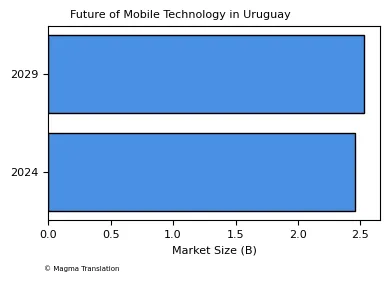
Mobile Security and Privacy Concerns in Uruguay
Challenges in Mobile Security for Users in Uruguay
As mobile technology continues to advance in Uruguay, security and privacy concerns have become increasingly important. With over 90% of the population having internet connectivity, the risk of cyber threats has also risen. Users are often vulnerable to data breaches and phishing attacks, particularly when using public Wi-Fi networks. The government and telecom operators are working to enhance security measures, but challenges remain. In 2023, it was reported that 55.69% of mobile traffic was attributed to unsecured connections, highlighting the need for better user education on mobile security practices. Additionally, the rise of mobile payment applications has increased the importance of secure transactions, as users seek to protect their financial information.
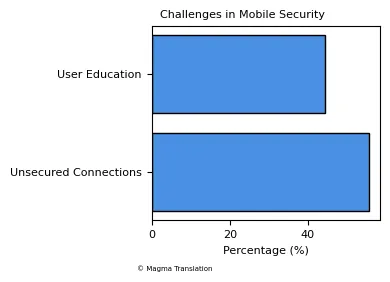
Mobile Industry Innovations and Developments in Uruguay
Emerging Technologies in the Mobile Sector
Uruguay is witnessing the emergence of innovative technologies in the mobile sector, particularly with the rollout of 5G networks. The government aims to achieve 13% 5G penetration by 2025, expanding to 65% by 2030. This advancement is expected to enhance mobile connectivity and support the development of smart cities and IoT applications. The adoption of 5G technology will also facilitate faster data speeds and improved network reliability for users.
Mobile Gaming Trends in Uruguay
The mobile gaming industry in Uruguay has experienced significant growth, with a rising number of users engaging in mobile games. As of 2023, it was reported that 55.69% of mobile traffic is attributed to gaming applications. This trend reflects the increasing popularity of mobile gaming among younger demographics, with many users spending considerable time on gaming platforms. The growth of mobile gaming is also supported by the availability of high-speed internet and advanced mobile devices.
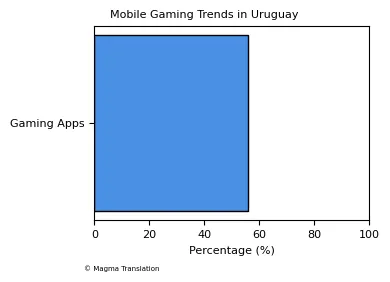
Impact of Social Media on Mobile Usage
Social media platforms have a profound impact on mobile usage in Uruguay. In 2023, it was reported that 66% of total purchases were made online, with social media playing a crucial role in influencing consumer behavior. Platforms like Instagram and WhatsApp are widely used for communication and marketing, driving engagement and sales. The rise of social commerce is transforming how businesses interact with customers, making mobile devices essential for e-commerce.
Mobile Infrastructure Development Initiatives
The Uruguayan government has launched several initiatives to improve mobile infrastructure across the country. The auction of multi-band spectrum has expanded LTE coverage, allowing for better connectivity in urban and rural areas. As of 2024, the mobile market size is estimated at USD 2.46 billion, with projections to reach USD 2.53 billion by 2029. These initiatives aim to enhance mobile services and ensure equitable access for all citizens.
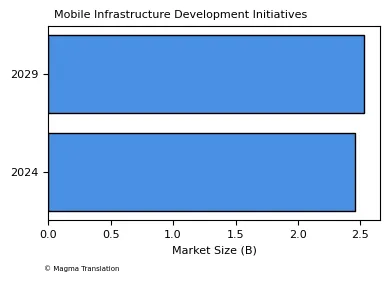
Consumer Preferences for Mobile Devices
Consumer preferences for mobile devices in Uruguay are shifting towards high-end smartphones. As of 2024, Samsung holds 32.68% of the mobile vendor market share, followed by Apple at 30.27% and Xiaomi at 22.2%. This trend indicates a growing demand for advanced mobile technology among consumers, with a significant focus on features such as camera quality and processing power.
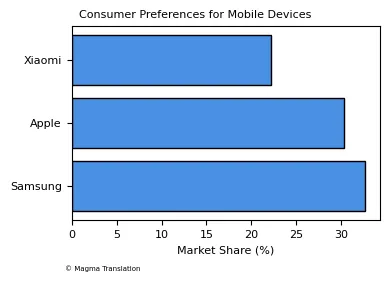
Mobile Health Initiatives in Uruguay
Mobile health initiatives are gaining traction in Uruguay, particularly in response to the COVID-19 pandemic. Telemedicine services have become increasingly popular, allowing users to consult healthcare professionals remotely. The adoption of mobile health solutions is supported by the increasing smartphone penetration and internet accessibility, with over 90% of the population having internet connectivity. This trend is expected to continue as more individuals seek convenient healthcare options.
Mobile Payment Trends and Adoption
Mobile payment adoption in Uruguay has seen significant growth, with users increasingly relying on mobile wallets and payment apps. In 2023, mobile payments accounted for a substantial portion of online transactions, reflecting changing consumer behavior towards digital payments. The average ad spend per internet user in the In-App Advertising segment is projected to be around $17.6 in 2024, indicating a shift towards mobile commerce.
Future Outlook for Mobile Connectivity in Uruguay
The future outlook for mobile connectivity in Uruguay appears promising, with ongoing investments in technology and infrastructure. The mobile market is expected to grow, driven by increasing smartphone ownership and the adoption of higher-ARPU 4G/5G services. The government aims to enhance connectivity and ensure that all citizens have access to reliable mobile services, positioning Uruguay as a leader in mobile technology in the region.
Mobile Payment Trends and Innovations in Uruguay
Growth of Mobile Payment Solutions in Uruguay
The adoption of mobile payment solutions in Uruguay has seen significant growth in recent years. With over 90% of the population having internet connectivity, mobile wallets and payment apps have become increasingly popular. In 2023, mobile payments accounted for a substantial portion of online transactions, reflecting changing consumer behavior towards digital payments. The convenience of mobile payments has led to a rise in usage, particularly among younger demographics who prefer cashless transactions.
Impact of Fintech on Mobile Payments in Uruguay
Fintech companies are playing a crucial role in transforming the mobile payment landscape in Uruguay. These companies offer innovative solutions that enhance user experience and security. As of 2024, the average ad spend per internet user in the In-App Advertising segment is projected to be around $17.6, indicating a shift towards digital marketing strategies that include mobile payment promotions. The collaboration between traditional banks and fintech startups is expected to drive further growth in mobile payment adoption.
Consumer Preferences in Mobile Payment Methods
Consumer preferences in mobile payment methods are evolving in Uruguay. Many users favor mobile wallets for their convenience and security features. In 2023, it was reported that 66% of total purchases were made online, with a significant portion conducted through mobile payment platforms. This trend highlights the increasing reliance on mobile technology for everyday transactions, as consumers seek faster and more efficient payment options.
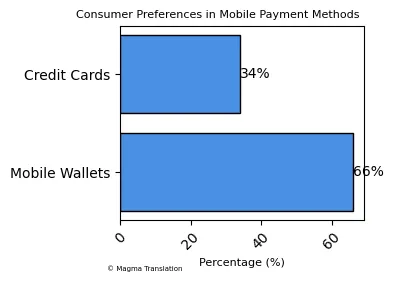
Challenges Facing Mobile Payment Adoption
Despite the growth of mobile payments, challenges remain in the Uruguayan market. Issues such as network reliability and security concerns can hinder user adoption. Additionally, the need for improved infrastructure and investment in technology is crucial for sustaining growth. As mobile payment solutions become more prevalent, addressing these challenges will be essential for ensuring a secure and efficient payment ecosystem.
Regulatory Environment for Mobile Payments in Uruguay
The regulatory environment for mobile payments in Uruguay is evolving to keep pace with technological advancements. The government is working to establish guidelines that promote secure and efficient mobile payment systems. As of 2024, the mobile market size is estimated at USD 2.46 billion, with projections to reach USD 2.53 billion by 2029. This growth underscores the importance of a supportive regulatory framework to foster innovation in mobile payments.
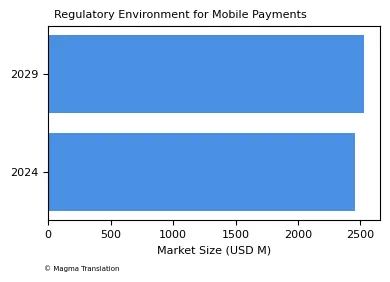
Future Innovations in Mobile Payment Technology
Future innovations in mobile payment technology are expected to enhance user experience and security. The integration of biometric authentication and blockchain technology is anticipated to revolutionize mobile payments in Uruguay. As mobile payment solutions continue to evolve, consumers can expect more secure and efficient transaction methods. The increasing smartphone penetration and internet accessibility will further drive the adoption of these innovative solutions.
Mobile Payment Security Measures in Uruguay
Security measures for mobile payments in Uruguay are becoming increasingly important as adoption grows. Users are often vulnerable to data breaches and phishing attacks, particularly when using public Wi-Fi networks. The government and telecom operators are working to enhance security measures, but challenges remain. In 2023, it was reported that 55.69% of mobile traffic was attributed to unsecured connections, highlighting the need for better user education on mobile security practices.
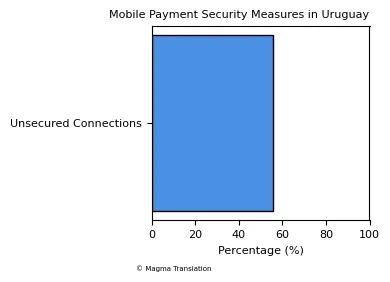
Consumer Education on Mobile Payment Security
Consumer education on mobile payment security is essential for fostering trust and confidence in digital transactions. As mobile payment adoption increases, users must be informed about best practices for securing their financial information. Initiatives aimed at educating consumers about potential risks and security measures can help mitigate concerns and encourage the use of mobile payment solutions.
Conclusion
Mobile connectivity in Uruguay is rapidly evolving, driven by advancements in technology and changing consumer behavior. The growth of mobile payments, coupled with the increasing adoption of smartphones and internet accessibility, positions Uruguay as a leader in mobile technology in the region.
